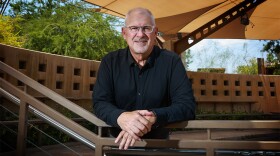The achiever
How Dr. Spirtos became among the best in his field: Slowly, steadily and thoroughly
Drive, ethics,teamwork, striving for excellence … if it sounds like training for the Olympics, there’s a good reason why.
Nicola Spirtos counts 18 doctors in his family, which hails from a town next to the Greek island of Kos, home of Hippocrates, the father of medicine. It’s not that Spirtos had no other choice than to become a doctor; it’s more accurate to say he was never really aware of any other choices.
Spirtos will proudly show you a photo of his father, George Spirtos, the only short-pants-clad 14-year-old in the class of young men entering Johns Hopkins University School of Medicine in 1930.
“I don’t know if my dad ever said, ‘You have to be a doctor,’” the son now says. “But I’ll tell you what he did say: ‘Whatever you’re going to be, you better damn well be the best.’”
This approach translated into a work ethic so intense that, in the 1990s, Spirtos called out fellow medical researchers at Stanford University whom he caught publishing inaccurate data. When he was told his actions would open him to similar scrutiny, Spirtos’ response amounted to, “Bring it on.”
In 1992, he began research on laparoscopy, a non-invasive technique, in gynecological surgery. It was a new millennium by the time he and his team had run statistics through the National Cancer Institute, performed feasibility trials, performed randomized trials comparing laparoscopy to traditional surgery, waited for data to mature and published results in 2009.
“It takes that long to do it right. I am really proud of the fact that we did it right and took no shortcuts,” says Spirtos, now known as the regional authority in gynecological oncology.
Spirtos believes accurate data is that last bastion of patient safety, which helps explain his position as professor and director in the Gynecologic Oncology Division at the University of Nevada School Of Medicine.
And since he obviously has spare time, Spirtos also runs the Women’s Cancer Center of Nevada. It made national headlines in 2009 on “60 Minutes," featured as one of the places Las Vegas cancer patients could turn to after University Medical Center closed its oncology clinic. The Women’s Cancer Center started the Cash for Chemotherapy program, which aims to help uninsured and underinsured women get the treatments they need to live.
“We take care of everybody here,” Spirtos says, adding, “It’s not just me. There’s a whole team of people who are supportive of those things. The team is on the same page, the same mantra, basically.”
That mantra? “The ethical treatment of patients with surgical excellence, and always continuing to learn” he says — just the kind of slogan you’d want from the team that’s competing to save your life.









